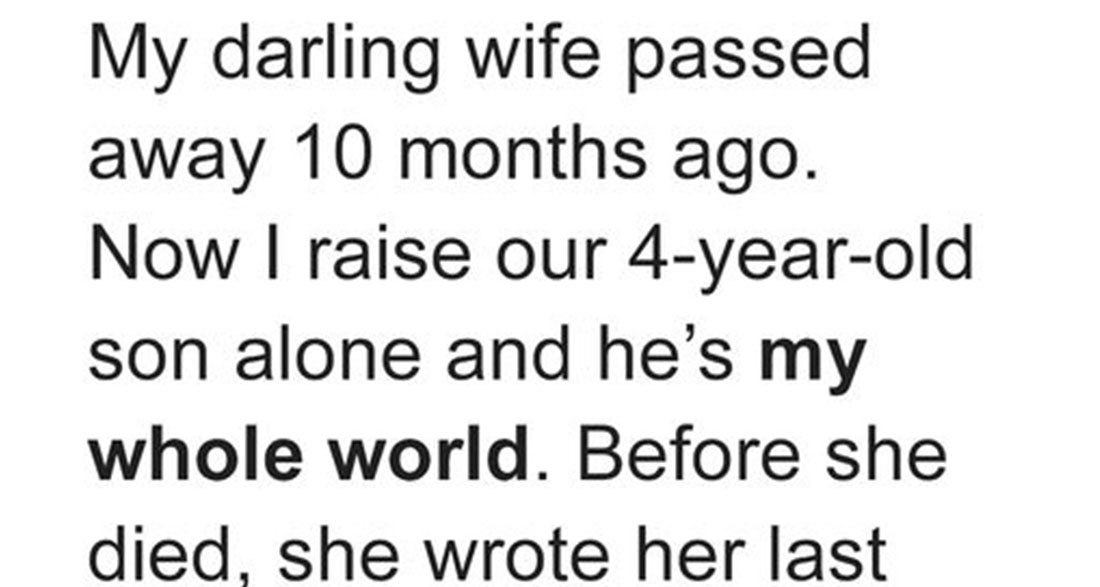Ten months after his wife passed away, a heartbroken widower finally found the courage to open the last letter she had left him. What he discovered inside was a confession so devastating that it led him to seek answers through a paternity test.
He and his wife had shared four wonderful years together, and the birth of their son made their happiness complete. But their joy turned to sorrow when his wife tragically died, leaving him alone with their four-year-old boy. For nearly a year, he poured all his energy into being the best father he could, trying to rebuild his shattered life around his son.
One day, he stumbled across the letter his wife had written before she died. He had known it was there, but he hadn’t been able to bring himself to read it—until that day. With a heavy heart, he unfolded the letter. At first, he was in shock, unable to believe what he was reading. But as he continued, the painful truth of her words began to sink in.
In the letter, she confessed that during her bachelorette party, she had gotten extremely drunk and had a one-night stand with a stranger. This happened just days before their wedding. When she found out she was pregnant, she realized she couldn’t be certain who the father was—her husband or the stranger. She wrote about her deep regret, admitting that there was a real chance that their son was not his biological child.
The widower was crushed. The woman he had loved and trusted had kept this painful secret from him, and now she was gone, leaving him to deal with it all alone. Desperate for answers, he decided to take a paternity test, praying that the letter’s confession would turn out to be wrong. But when the results came in, his worst fears were confirmed—the boy he had raised and loved as his own was not his biological son.
In that moment, he wished he had never taken the test. The knowledge felt like a huge weight pressing down on him, one he wasn’t sure he could bear. Even though his heart was broken, he realized that his love for his son hadn’t changed. But now, every time he looked at the boy, he felt a painful sting of betrayal.
Needing to share his pain, he turned to the “Off My Chest” subreddit and poured out his story. He wasn’t really looking for advice, but the responses came pouring in, filled with compassion and support. Strangers told him that his feelings were normal, that it was okay to grieve for the life he thought he had.
One commenter shared their sympathy, saying, “I am so incredibly sorry. All your feelings are valid.” Another offered some practical advice, suggesting he take a drive to clear his head. The widower appreciated all the support, but he admitted that knowing the truth made him feel more alone than ever.
When his son, who had been staying with his grandparents, came home, the widower was nervous. He worried about how he would react. Would he be able to look at his son without seeing the shadow of his wife’s betrayal? But the moment he saw his little boy, all his fears melted away. He rushed to hug him, feeling the warmth of his son’s small arms around him. In that moment, he knew that nothing had changed—this boy was still his son, no matter what the paternity test said.
Even though his wife’s letter had caused him deep pain, he made a vow to continue being the best father he could be. He was determined to let his love for his son guide him, even as he worked to heal the wounds left by his wife’s confession.
As he thought about it, he wondered how things might have been different if he had learned the truth while his wife was still alive. If she had confessed before she passed away, they might have been able to confront the issue together. Their marriage might have been tested, but he believed that his love for his son would have remained strong.
Some people might say his wife should have taken her secret to the grave, but the widower had mixed feelings. While part of him wished he had never found out, another part knew that the truth, as painful as it was, allowed him to make peace with the situation and continue loving his son without reservation.


